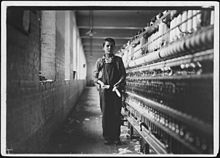| This article needs additional citations for verification. Please help improve this article by adding citations to reliable sources. Unsourced material may be challenged and removed. Find sources: "Bobbin boy" – news · newspapers · books · scholar · JSTOR (March 2011) (Learn how and when to remove this message) |

A bobbin boy was a boy who worked in a textile mill in the 18th and early 19th centuries. One example of rising from this job to great heights in America was young Andrew Carnegie, who at age 13 worked as a bobbin boy in 1848.
Description
| This section does not cite any sources. Please help improve this section by adding citations to reliable sources. Unsourced material may be challenged and removed. (January 2023) (Learn how and when to remove this message) |
In the 18th and early 19th centuries, bobbin boys worked in textile mills. The boys brought bobbins to the women at the looms when they called for them, and collected the full bobbins of spun cotton or wool thread. They also would be expected to fix minor problems with the machines. Average pay was about $1.00 a week (equivalent to $37 in 2023, compared to 1900), with days often beginning at 5:30 am and ending around 7:30 pm six days a week. The job as a bobbin boy was extremely dangerous, and there was always an extreme risk of death.
Notable bobbin boys
One example of rising from this job to great heights in America was young Andrew Carnegie, who at age 13 worked as a bobbin boy in 1848. The following persons once worked as a bobbin boy:
- Andrew Carnegie, the great steel tycoon
- Nathaniel Prentice Banks, Governor of Massachusetts and Union general
- Robert Frost, poet
See also
Notes
- ^ Carnegie, Andrew (1920). Autobiography of Andrew Carnegie. p. 34. ISBN 9780722221914.
- "Carnegie Started as a Bobbin Boy". archive.nytimes.com.
- Hollandsworth, James (1998). Pretense of Glory: The Life of General Nathaniel P. Banks. Baton Rouge, LA: Louisiana State University Press. p. 4. ISBN 0-8071-2293-9.
- Faggen, Robert, ed. (2001). The Cambridge companion to Robert Frost. Cambridge companions to literature. New York: Cambridge University Press. p. 246. ISBN 978-0-521-63248-5.
This job-, occupation-, or vocation-related article is a stub. You can help Misplaced Pages by expanding it. |